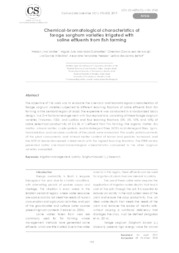Chemical-bromatological characteristics of forage sorghum varieties irrigated with saline effluents from fish farming.
Chemical-bromatological characteristics of forage sorghum varieties irrigated with saline effluents from fish farming.
Author(s): SIMOES, W. L.; GUIMARÃES, M. J. M.; ARAUJO, G. G. L. de; WILLADINO, L. G.; PERAZZO, A. F.; BELFORT, L. dos S.
Summary: The objective of this work was to evaluate the chemical and bromatological characteristics of forage sorghum varieties subjected to different leaching fractions of saline effluents from fish farming in the Semiarid region of Brazil. The experiment was conducted in a randomized block design, in a 3×4 factorial arrangement with four replications, consisting of three forage sorghum varieties (Volumax, F305, and Sudão) and four leaching fractions (0%, 5%, 10%, and 15%) of saline (electrical conductivity of 2.5 dS m-1) effluent from fish farming. The organic matter, dry matter, mineral matter, crude protein, neutral detergent fiber (NDF), acid detergent fiber, lignin, hemicellulose, and cellulose contents of the plants were evaluated. The crude protein contents of the plant components, and mineral matter content of leaves and panicles increased, and the NDF of leaves decreased in treatments with the highest leaching fractions. The F305 variety presented better chemical-bromatological characteristics compared to the other sorghum varieties evaluated.
Publication year: 2019
Types of publication: Journal article
Unit: Embrapa Semi-arid Region
Observation
Some of Embrapa's publications are published as ePub files. To read them, use or download one of the following free software options to your computer or mobile device. Android: Google Play Books; IOS: iBooks; Windows and Linux: Calibre.
Access other publications
Access the Agricultural Research Database (BDPA) to consult Embrapa's full library collection and records.
Visit Embrapa Bookstore to purchase books and other publications sold by Embrapa.

